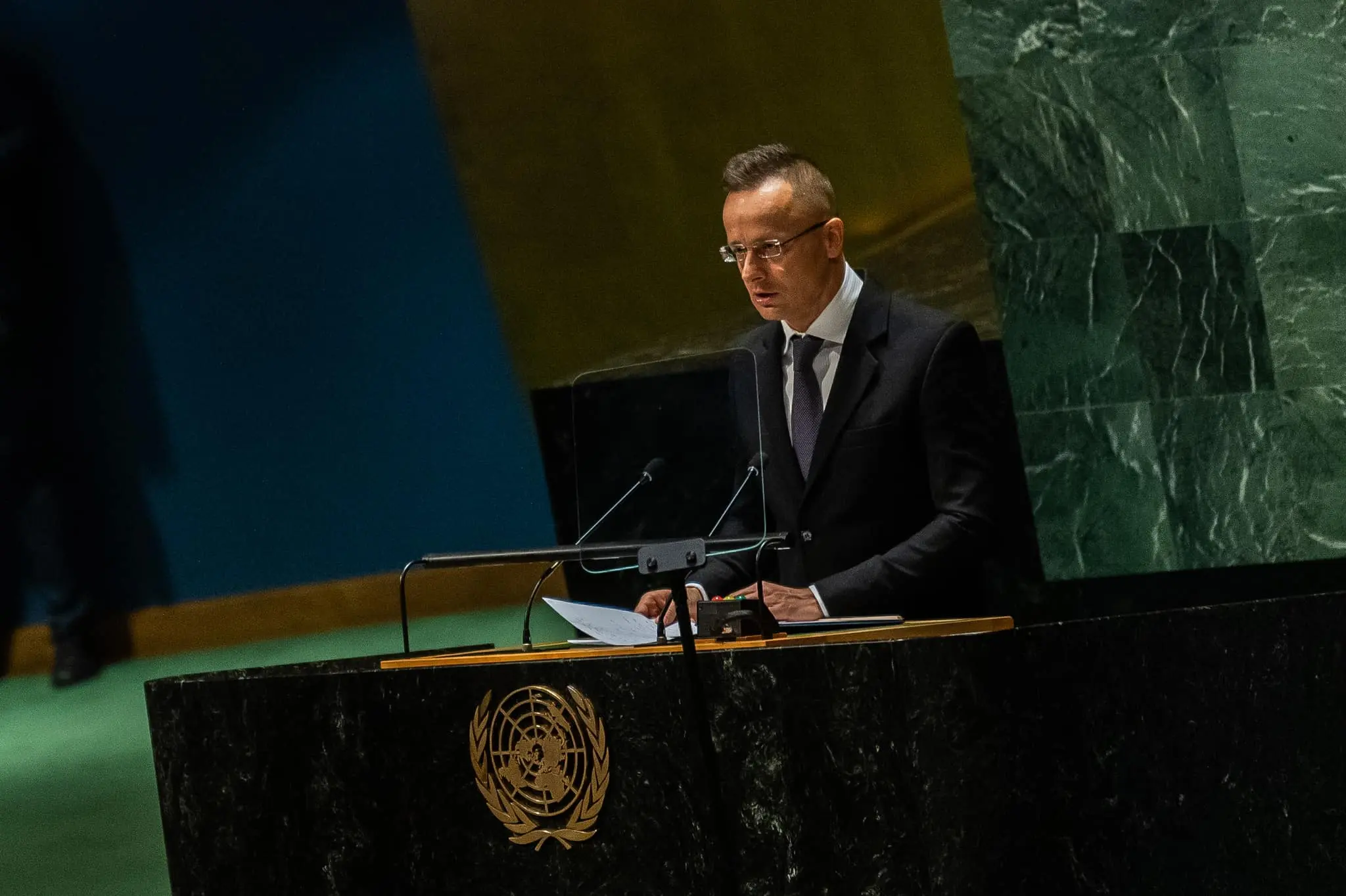Hungarian foreign minister: those speaking about peace are not spies, Trojan horses

Change language:
Hungary and China agree on the need to multiply diplomatic efforts aimed at establishing peace, Foreign Minister Péter Szijjártó said in New York on Tuesday after a phone call with Wang Yi, his Chinese counterpart, adding that the UN had a special responsibility in this. Attacks by pro-war European politicians will give further encouragement to the Hungarian government to continue its peace mission because Hungary wants peace instead of war and only peace can make Europe great again, Szijjártó said in New York.
The UN cannot hide
“The UN must finally speak out and finally take on a role,” Szijjártó said, according to a ministry statement. “The UN cannot hide in the comfortable offices in New York, but must take a stand for reopening diplomatic communication channels.”
He noted that the UN had been established to allow for dialogue between those locked in conflict.
Szijjártó said the Hungarian government had recently “come under attack” from “all of Europe’s pro-war politicians”, but this “won’t deter us from continuing the peace mission”.
Mr Szijjártó on phone with his Chinese counterpart, Wang Yi:
He said the liberal mainstream was “pushing pro-war propaganda in the transatlantic bubble so hard”, that it gave people in Europe and America the impression that “this is the opinion of the whole world, when it is not”.
Majority wants peace
“The global majority wants peace and doesn’t at all understand why Europe doesn’t have a peace strategy . why it’s copying the American strategy,” Szijjártó said. “And the global majority is watching the efforts of the Hungarian peace mission with great sympathy, interest and appreciation.”
Szijjártó said he will meet his Russian counterpart, the UN Under-Secretary-General for Peace Operations and the president of the International Committee of the Red Cross.

“This war going on in Ukraine has caused an enormous humanitarian disaster; we Hungarians can see that as well,” he said. “We’ve welcomed more than a million refugees, we see the separated families, we see the forced, unacceptable conscription operations that violate all human rights.”
Szijjártó warned against the danger of “the Western world ignoring the risk of escalation” when making decisions on weapons deliveries.
Meanwhile, the minister said he is also scheduled to hold talks on Tuesday with executives of American companies such as Kyndryl and Johnson and Johnson on potentially bolstering their presence in Hungary.
New scholarships
He said he will also hold talks with his Bahraini, Iranian and Cape Verdean counterparts.
He said Hungary and Bahrain will finalise an investment protection agreement, and said it was “good news” that a Hungarian company had provided the opportunity for cashless payment at the last Formula One Bahrain Grand Prix.
Meanwhile, Hungary and Cape Verde will sign an agreement on Hungary continuing to offer scholarships to 20 university students from Cape Verde each year, he said. Also, Hungarian companies will carry out investments with a view to improving the water supply as part of a 42 million euro tied-aid scheme, he added.
Szijjártó said he will also meet his Iranian counterpart and tell him that Hungary’s interests lay in the swiftest possible resolution to the Middle East crisis.






Sad how Hungarian politicians keep using the insulting “pro-war” term about everyone who do not agree with Hungarian politics. Everyone is pro-peace but the difference is how the peace is achieved. Hungarian politicians are fine with total surrender of Ukraine and what is left of Ukraine to be in total control of Russia.
Most other countries are not OK with that. Calling those countries pro-war that are not OK about Russia invading a sovereign country is purely insulting. Peace is what everybody wants but at what price? That is up to the Ukraine to decide and until then we need to help Ukraine to defend itself.
Nobody respects such insulting bullies like Hungarian politicians are.
@ostanus, I agree entirely. It’s telling that the EU and NATO are in alignment on this matter and Hungary stands alone. Other regional countries have been affected to a far greater degree than Hungary, Poland for example has taken in some 1.5 million Ukrainian refugees at no small cost while it’s used as a transit point for people and goods heading in and out of Ukraine, representing a significant burden on its infrastructure. I’m sure Poland would be overjoyed to see peace return! Hungary meanwhile has been given a wide berth by Ukrainains for understandable reasons and its territory is not used as a transit country for goods and weapons to Ukraine, while anecdotally few Ukrainians are using it as a transit country for travel to the west, by rail, air or road.
Hungary is not used for transport route by Ukraine because Hungary does not allow the movement of weapons through its territory. Hungary also stopped Ukrainian grain dumping in Hungary. Less transport also means less air pollution. Hungary is the winner.
Transport by sea is cheaper, and Poland does have harbors.